I inhale deeply.
It is past 1 p.m., local time. I breathe in Africa. It smells of Mother Earth.
I press my feet to the ground and look up at an overcast sky and inhale again. The smell of rain, earth, people and flowers hangs in the air. It is the smell of a new country and a new experience. All around me is green, rich and vibrant. It is like no place I have seen before.
I am in Tanzania at last.
I catch sight of a smiling face attached to a round body covered in floral prints waving a name card spelt wrong. That face belongs to David, the man appointed to convey me to Moshi. As I am the only brown arrival at Kilimanjaro airport the misspelt name card seems rather unnecessary.
I have a feeling that floral prints are trending in Tanzania.
David’s fat outstretched arm reaches out to grab mine and unwillingly I reciprocate. I feel small and vulnerable in his dominating presence.
“David! Oh, I am so in love with Africa already. What a beautiful country. Such lovely smells…”
David has taken control of my hands is giving it a good shake. The well-being of my hands is at stake. I must find a way to extricate it before it comes loose.
“Karibu. Welcome to Tanzania Ms Anjaly. Welcome, welcome. Hope you had a good flight.”
“Thank you, David, oh I love it here already. Do you think it will rain? David? Oh, I love rains…I wish it would rain,” and yank my arms pretending I had an emergency that required the need of it.
David’s smile vanishes.
“Ah ah, too much rain now. Every day you see rains,” he says unhappily, unable to understand why I would wish for rains under the circumstances.
“We go this way. Let me carry your bags. Come with me, Ms Anjaly. Welcome to Tanzania again. Karibu.”
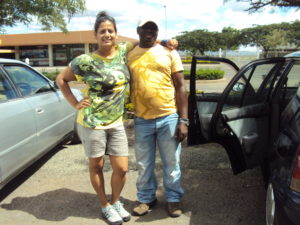
“Oh, I can manage alright,” I reply a little too late, for he has gallantly picked up and hoisted it over his shoulder leaving the driver to carry the duffel bag. I follow him with a smaller backpack that holds my passport and other essentials.
I like it how David addressed me as “Ms Anjaly” with so much respect.
I take my seat beside the driver. A wave of passengers walks past us but I don’t see the Englishman anywhere. It looks as though it will rain any moment now. I am looking forward to it.
The driver is a small man in a faded brown shirt who without waiting for David’s instructions, starts the car.
David is still smiling as he climbs in. I fumble for the seatbelt. The sound of a plane taking off drowns the roar of the car engine.
“You are okay there? Yes? Seatbelt? Hakuna Matata. No problem, this is Africa, you don’t need it.” David laughs at his own announcement.
“Oh well, so be it. I am sure I will survive.”
We edge out of the airport and plunge straight into the heart of Tanzania. With every passing mile comes a new and prettier sight, elevating my spirits to newer heights.
Like every first-time visitor eager to experience everything at once, I wave at little black children, occasionally making appreciative clucking sounds, ooh-aahing at brown cows and vibrant maize fields and gasping in mock horror at old mini vans racing to the moon. Clouds continue to build, cold, damp air pushes its way in through the open window and all I can think of is how happy I am.
“These daladalas, they are very dangerous. They move very fast.” David says every time I gasp. “No daladala in Dubai? How is Dubai?”
He is trying to strike up a conversation when all I want is to watch Africa before my eyes in silence. I can ask questions later. But I answer. I suppose he is eager to learn of my country as I am to learn of his.
“Daladala? Oh, so that’s what they are called – daladala, kind of cute! I’d like to ride one sometime! But really, are they always so full? Look, people are sitting in the windows! Oh, look that chap is hanging on the door! Horror!”
“Daladala in Dubai? No and no!”
At this point our old car is rudely overtaken by a daladala which, like its predecessor, has a small black butt firmly pressed against the window and a small black arm hanging outside, clutching a small bag with a live chicken, now properly wet.
“You see that?” David says viciously. “Very dangerous. But mzungu, you like to try always. Me, ah ah – I do not like them. Very dangerous. They carry maybe thirty people when they should carry sixteen. I am telling you Ms Anjaly, you do not try daladala. Very bad, that one. Africa not like Dubai.”
“I am sure it’s alright. Looks like much fun. Oh, what’s mzungu? I have heard that before, I can’t remember how or where, but definitely so. What is it?
“All foreigners we call mzungu in Swahili. You get used to it.”
He nods determinedly. It begins to rain. I am forced to roll up the window. Tanzania looks different through the glass and with no sounds to compound the effect, I start to drift. It is getting warm inside the car, but there is nothing we can do. The wipers fight the persistent rain on the windshield bravely and I peer through the half circle at the wet roads from time to time.
The road to Moshi is not built or operated with the idea of making life easy for its users, but it serves its purpose. It is choked with vehicles. The uneven roads slope at the side and disappear into pools of orange water, some large enough to drown a small cow.
Soon Moshi, our destination, appears out of a thin fog. We slow down considerably to let people, daladalas, cars and bikes pass by exhaling thick kerosene fumes. There are simply too many bikes in Moshi and none of the riders wear helmets. Moshi clearly isn’t big on citizens’ safety. Well built, curvy women trudge past in brightly coloured garments unmindful of the noise and fumes. I make a mental note to ask David about their clothes later.
We stop under a tree by the sidewalk. It has stopped raining. David steps out immediately and opens the door for me.
“We are in Moshi now,” he says. “This is your hotel.”
I smile, take a deep breath and step out into a small puddle to look at the hotel I am going to stay at. Hotel Kindoroko rises straight out of the sidewalk in Moshi’s main street. A uniformed guard respectfully steps aside to let us pass through the short, narrow corridor that opens into a wide hall which looks like a souvenir store. I look around. On the wall are giant wooden masks and at my feet is a wooden crocodile with its mouth wide open. It appears to be making straight for my feet.
I step away.
Someone giggles. David guffaws. I shiver a little.
“Jambo. You get scared? They will do nothing to you. Some more in your room,” says a female voice and I follow it to a well-dressed, slim woman with cornrows who appears magically from behind a large wooden desk.
“Welcome to Hotel Kindoroko.”
I manage a weak “hello, jambo, how are you” before voicing my query.
“I need coffee first. I will check in later if that is alright, but I need coffee first. David? Would you like to join me?”
“You will have coffee there,” says the girl with cornrows pointing towards an ugly leopard with extremely large and shiny eyes. “We put your bags in your room Ms Anjaly. You take coffee.”
Behind the ugly leopard is a door leading to a small garden full of trees and wet furniture, but it is welcoming. The smell of rain floats to my nose, the trees drip water and somewhere something chirps…a bird? An African insect? Cricket, perhaps? Everything is full of drama and romance. It is what I’d imagined Africa to be, including David’s guffaws. When the coffee is placed on the table, David is still laughing but I have reached a new level of bliss.
I inhale the smoky scent of the coffee. With the first sip the caffeine carries stimulants to my brain making it come alive. I ponder over what little I know about Moshi. There is so much to look forward to in my time here. First, I will climb my dream mountain in its backyard after which I’ll go on a safari through the African wild.
The second sip of the midnight black coffee sends caffeine charging through my limbs. I feel warm and alive, a different person. As long as there is coffee to have, I am going to be ok.
David rises. He has to leave, he says. I nod happily.
I offer him my hand. He doesn’t dwell over it too long this time.
“Wish you all the best for the climb,” he says. “Your guide will be here shortly. He is a good man, very strong. Have a good stay in Tanzania. I will see you in seven days.”
He doesn’t offer to pay for the coffee.
My luggage is neatly laid out in my room on the ground floor facing the garden. The room is small but has everything, including hot water, towels, linen and a mosquito net. A small table and a chair complete the picture. It is perfect, I feel safe.
I resist the urge to lie down before my guide arrives because what I really want is to explore Moshi, to establish a connection with its roads and its people.
There is a gentle knock on my door. It is Jenna, the receptionist with corn rows.
“Come with me, let me show you something.”
I follow her to the terrace. It is chilly but the clouds have cleared up a little. We cross the wet terrace and come to stand at a point that has fantastic views of the street below. She points north. I follow her finger.
…And gasp.
“That is your mountain. You see it? Mt Kilimanjaro.”
In the far distance rising out of the earth is a huge, grey mountain standing alone and majestic, partially hidden by clouds. Snow has settled permanently at the top and there is some running down the sides almost to its base. There is certain unreality even in the thought. Ernest Hemingway’s book Snows of Kilimanjaro had immortalized that name. What I see is just like the title. Is it possible that I will stand there, among those clouds touching the snows?
I react in three ways.
I hug her. I scream. Then I jump.
“It’s beautiful…it is. Oh, sweet Jesus, it is a beautiful mountain indeed and pretty damned tall. All that snow! Always there, yes? But look – it is also running down the sides too. Holy crap – that’s a bloody lot of snow. It is tall! Oh dear God, but it is beautiful.”
“Yes. Much snow in March but you will do it, I am sure. Just look at it and wish for your dream to come true. It will. Everyone who come to climb Kilimanjaro stand here and pray. When you come back, you put your name on the cactus leaf like all who stay here and climb Kilimanjaro.”
“Have you ever been to the top?”
“No, But I will someday. I want to.”
“Damn, now I need coffee again. Something to celebrate the first sight of it.”
“Your guide will be here now. Maybe he can take you to a coffee shop. I will tell him. Do you like Africa? First time, yes?”
“Yes. It is…it is…raw and magical,” my voice trailed away into a whisper for I had turned to look at the mountain again and it suddenly appeared closer and bigger than before.
“Say, is it really hard to climb? Marangu route is easier, right? Oh, I don’t know, I just like looking at it. It is magnificent.”
“You see in the morning, it is very clear. You eat breakfast here and watch the mountain. Hope there is no rain tomorrow. You go to Materuni tomorrow, yes?
“Yes, I believe that’s the plan. Acclimatization, they call it. It will be great to get out into the wild.”
“India has many mountains also, yes? And forests and elephants? Our elephants are bigger. Hindi. You speak Hindi? There are many Indians here for many years, like us now. But many more in Kenya.”
“Yes. Indians are everywhere.”
“You live in Dubai, yes?” They tell me that. Very big buildings there and oil. Arab country is very rich, yes?”
I didn’t expect to be holding a conversation about India and UAE on a terrace facing Mt Kilimanjaro but I am pleasantly surprised at her grasp of world affairs.
“You are very well informed. Have you been to Dubai?”
“No. But I want to. I watch Indian movies, and I like them. Also the songs, I like them.”
“Hey, I know your songs too, actually just one – Malaika nakopende malaika, we have Hindi version of that song.”
“Do you know the person who wrote the song comes from Moshi? But some people from Kenya say it is their song, but that song is ours. From here.”
I am surprised at this piece of information. Two countries claiming ownership of the song that got copied into so many languages worldwide is slightly amusing. A smile stays on my face as I look away from the mountain and down at the streets lined with low houses and shops and clogged with smoke spewing bikes and daladalas, hearing the sounds of blaring horns and screaming children. It is calming. It is magical.
I am slowly getting under the skin of Tanzania – the country which gave birth to a mountain that has changed my life.
Someone coughs beside us. I turn to see a tall, wiry man with a tattoo on his arm standing respectfully, waiting for his announcement to take effect. A pair of lively eyes looks out of a long, narrow face with sunken cheeks and long straight nose above the slightly protruding jaw. Everything about him is thin and long.
“Habari.” Jenna launches into a conversation excitedly with this stranger. “Ms Anjaly, this is your guide, Siraji.”
“Jambo.”
“Jambo.”
“Karibu. Welcome to Africa.”
I stretch my hands. He hesitates at first, then takes my hand in his. His grip is steely and confident. There is nothing overfriendly about it.
“Nice to meet you Siraji. How you doing?”
“Nzuri. In Swahili, you say nzuri. I am fine. Thank you.”
I like him.
Jenna speaks to him hurriedly but I catch the words “café” and we slowly walk down the stairs to the lobby, my heart full of hope. It will be wonderful to have some local coffee in a real Tanzanian café. I am looking forward to establishing a connection with Moshi, although briefly, through coffee.
Siraji leads the way out of the hotel, turns right and walks rapidly leaving me no choice but to run after him. It feels good to get the blood flowing through my body again. The uneven pavements, street vendors and wet roads become became my first real connection with Tanzania.
“Mzungu, jambo, mzungu,” children call out as they walk past us, not really waiting for a reply and continuing a conversation that is lost in the roar of bikes.
“Jambo. Hey Siraji, how am I mzungu? I am not exactly white, correct? Foreigner perhaps, but Mzungu? It’s cute though, I mean slightly racist too, but I can live with it.”
“It is like a tradition, all foreigners are mzungus. Racist, what is that?”
I have no answer to Siraji’s question. David had said something about mzungu being a more personal name, unlike the more generic ‘foreigner’ which nearly always means “darned tourist.” Mzungu is a way being accepted into their local ways, I suppose you could say so.
Daladalas splash the pedestrians in their hurry to get somewhere unmindful of the ensuing curses and threats.
“Very bad this daladalas, you must be careful. Also boda boda – like a bike taxi. Very dangerous.”
“Boda boda?”
“These bikes you can see? They are like taxi. Cheap but dangerous. No rules for them.”
That explains the presence of these bikes. Local taxis indeed. What a novel idea it is too. Bikes are after all easier to get around.
“You mean, I can simply stop one and get on it and go away? Just like that? Are they safe – I mean, they are licensed to drive people?”
“No. Not all.”
We turn a corner.
A dull board announces a name – Aroma Coffee House – followed by their punchline determined to draw uncertain customers in.
Without coffee, there is no tomorrow.
It has the desired effect on me.
“Let’s go there, Siraji. I like the name.”
I sit myself on a stiff wooden chair; straighten the sugar pot and napkin holder before looking at the menu. Siraji’s eyes hover somewhere between my face and hands engaged in arranging the table cloth. I look up to see a frown on his face.
“I suppose that’s what you call OCD.”
Siraji doesn’t understand that, so he continues to look at me and says nothing.
The coffee shop is almost empty except for a handful of mzungus bent over newspapers and Nokia mobile phones, looking as though they belong here. I suppose they do belong, because they have reached a level of comfort even in these wooden chairs which could only come from long experience.
A young man named Phil appears at my elbow. I mouth the word coffee.
“Jambo. Hot coffee or cold?”
“Hello to you too. Hot, please. Siraji? How about you?”
“Thank you, I don’t take coffee in the evening.”
The waiter interrupts.
“With milk and sugar?”
“No. Nothing at all. Black and strong…like you,” and flex a mock muscle to drive home the point I am trying to make.
Both of them smile.
Something like relief passes over me. You know how it feels when you hold on to something so long and suddenly you find a place to put it down? Like knowing that the mountain you were carrying was only meant to be climbed?
“I think it’s the smell of coffee or something like that and I am not even sure why I said what I said. Hope you don’t mind,” I say to cover my embarrassment. I still have no idea how the locals react to statements like that.
“Excuse me? Strong like me, you say. Like me. I like that. No sugar? Sure? Maybe little?”
“No sugar. No milk. Just you in a coffee cup, how’s that?”
Phil the waiter sails away happily and soon the hissing and gurgling sound of a coffee machine reaches us. In the meantime, Siraji acquaints me with the one word I am going to use a lot.
Phil places the coffee on the table before me. I inhale the aroma and smile happily.
“Asante.”
Coffee is good, slightly acidic but strong with some superior flavor as is the case with coffee grown in Africa and I enjoy it immensely. It tastes of Africa, although I am not sure how I can explain that. It is very different to the coffee of South East Asia and a far cry from the smooth and earthy kopi luwak. This is only my second coffee since arriving in Tanzania and I feel like an authority on it so I say this without further ado – even if you never get the chance to visit Tanzania yet, you must get a taste of it in your coffee cup.
Phil returns with a plate full of peanut brittle.
“For you, miss. Kashata, our specialty.”
“Asante.”
Three hours in Tanzania, two cups of coffee and a few words in Swahili has paid off. For the next few minutes there is only the slurp of coffee and crack of kashata. Then I cup my hands around the coffee as if it’s a baby bird that needs protecting and wonder how the plate got empty so fast.
I tell Siraji of my desire to eat local Tanzanian food. It is not quite dinner time yet, but I am eager to acquaint him with my intentions.
“No mzungu food for me. What’s a typical Tanzanian dinner by the way? If I were you, what would I eat for dinner tonight?”
Siraji is a slow to follow. It could be my accent or the speed in which I speak when I am excited, so I repeat myself, slowly this time. He brightens up.
“You eat ugali. With some chicken and chips. Or goat meat. There is a good restaurant and I will take you there to take dinner.”
He almost got it, almost. My idea of tasting Tanzania is through its street food but I am not sure how to explain what I want. I have a strong desire to eat what people eat every day. Not the modified version that gets served in restaurants.
“Alright. But you know what I mean, right? Street food? Something like that?”
“Like kebabi? You must be careful with your stomach. You will climb Kilimanjaro soon. We eat local food after Kilimanjaro.”
“But why? I think I can manage any food, really. Come on, any local food will do.”
“I know what you want,” he says again and hope grows in my heart. “But my advice don’t eat food. Your stomach must be strong.”
I see the point he is trying to make and appreciate his concern. We walk back to the hotel through the flood of boda bodas. It is slowly getting dark and the roads glisten in the pale street light. Most of the shops have downed shutters and secured their possession behind sturdy grilles. No one screams mzungu at me as we make our way back. Siraji has an errand to run and will meet me for dinner in an hour. I need to shower and perhaps rest a little.
As we approach Hotel Kindoroko I see a dimly lit board that says The Taj Mahal. It is a restaurant named ambitiously but is clearly a hotspot of mealtime activity. Nearly all the tables are occupied.
But there is something a little beyond Taj Mahal that catches my eye.
A food cart with a tall, muscular man in red t-shirt brandishing skewers on which is some kind of meat. A coal stove hisses dangerously beside him. The smell of smoky meat reaches us before we reach this spectacle. I am overjoyed.
“That,” I scream ecstatically. “Siraji that is what I want to eat. I love the smell of it also. What is that?”
“It’s mishkaki,” he tells me with pride. “It’s like a local grill. You want try that? Sure?”
“Yes. Oh yes.”
Two hours later Siraji and I have a mini-feast on mishkaki, chicken legs and chipsi and I have come to the conclusion that I can live in Moshi all my life if I am assured of a few sticks of mishkaki every night.
I go to sleep thinking of Mt Kilimanjaro and somewhere in those thoughts mishkaki appears like a pleasant change. I have tomorrow to eat some more.
The restaurant named The Taj Mahal remains unexplored.
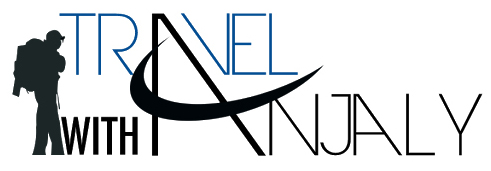
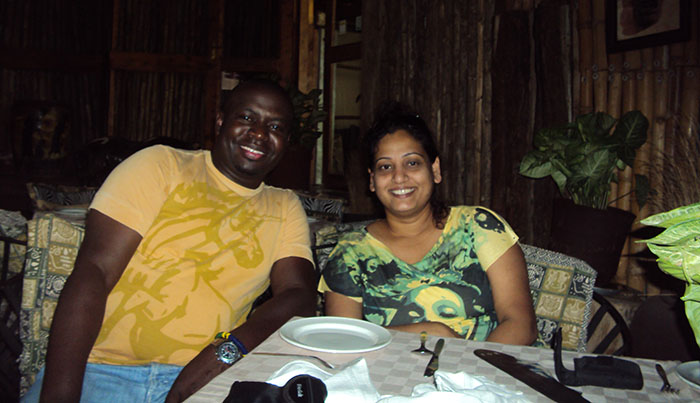
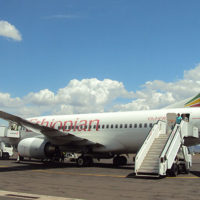
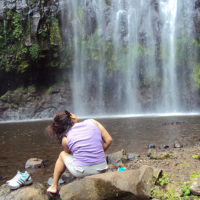
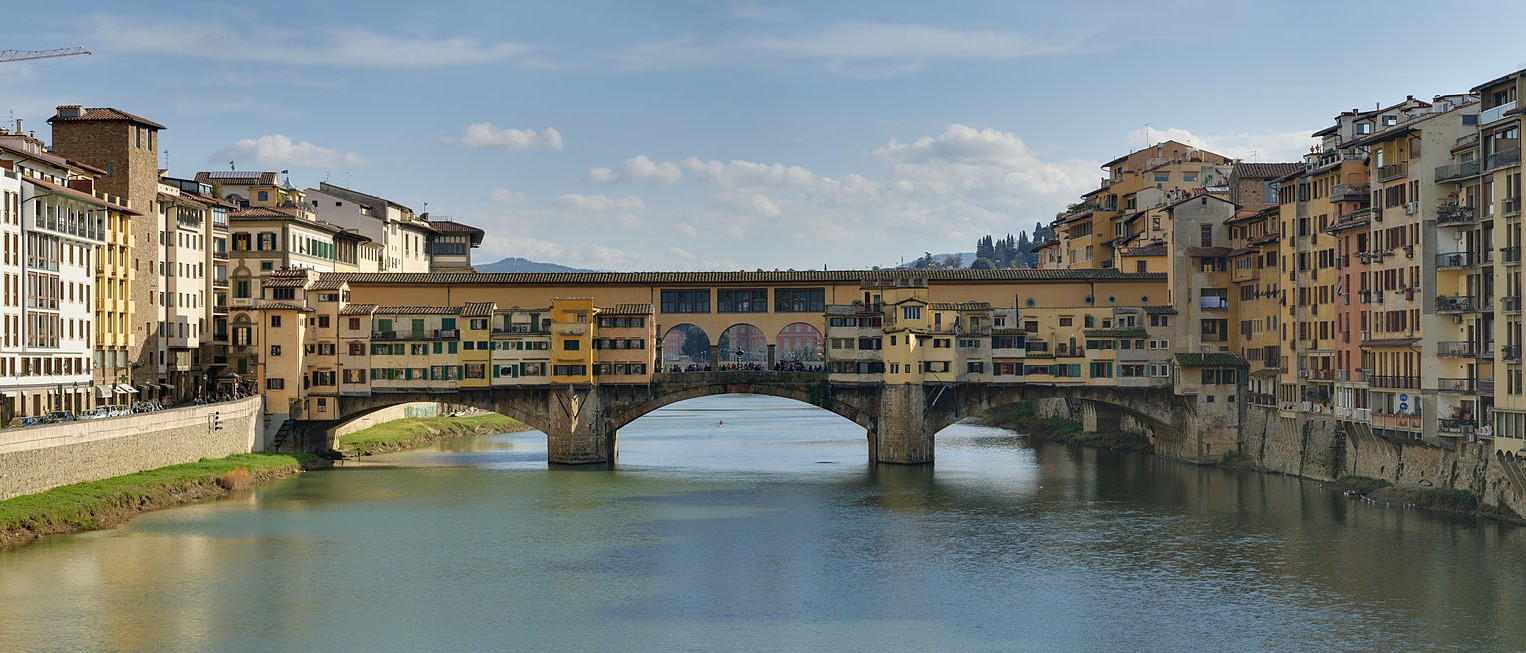

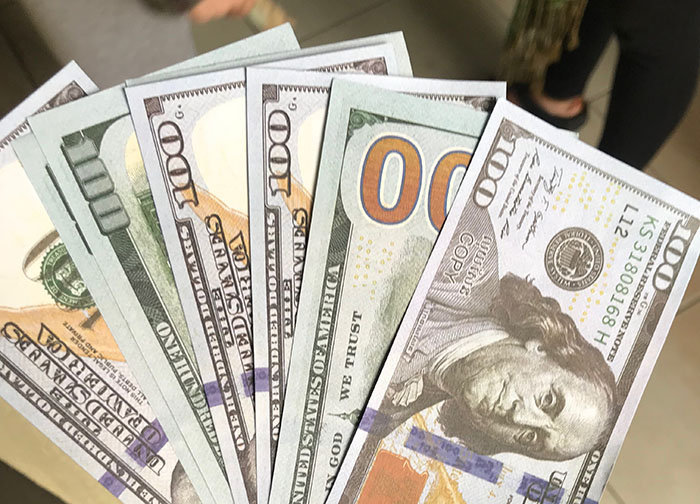
It is really a fantastic experience to read about your travelogue through your esteemed ‘travel With Anjaly’ .Your experience in Tanzania and the people of Tanzanians have given a good outlook about the Tanzania;s customs, culture and the rich heritage that they are following even in this 21st century.Wishing you all the best.